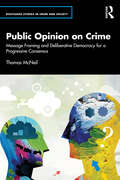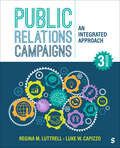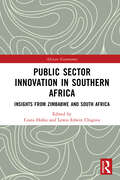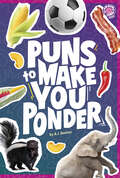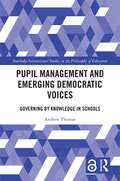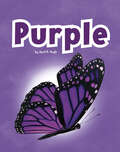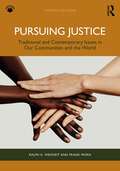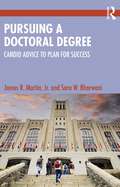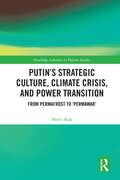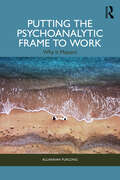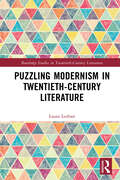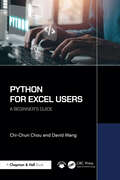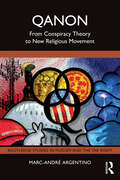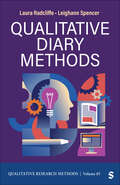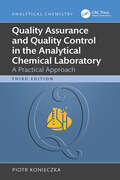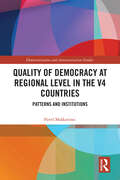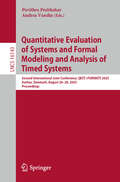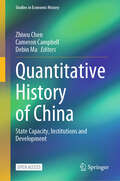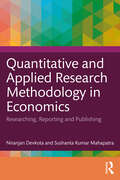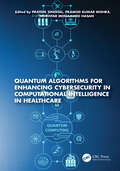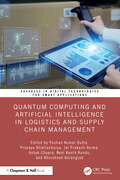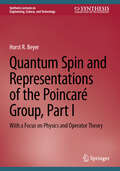- Table View
- List View
Public Opinion on Crime: Message Framing and Deliberative Democracy for a Progressive Consensus (Routledge Studies in Crime and Society)
by Thomas McNeilExamining the interrelationship between political rhetoric, reactionarygovernments and discriminatory ideologies, this book offers a fuller account of how our views on crime are formed.From media headlines to community groups on social media, fear of crime permeates society. At its worst, societal anxiety manifests in public demands for ever harsher approaches to punishment or the weaponising of crime by exploitative political leaders. In either case, societies are often distracted from the real factors behind crime: poverty, hardship, abuse and lack of opportunity. Many researchers and policymakers recognise this harmful spiral but struggle to answer the question: How do we create the conditions for better public debates on crime? This book explores public opinion theories highlighting a degraded civic and media debate on crime. As an antidote, the author presents evidence on how to hold better public conversations, using facts, emotion and message framing capable of shifting punitive attitudes towards a progressive consensus. It offers a unique perspective on the kinds of democratic changes needed, as well as new insight into the arguments people need to hear when discussing crime and justice. With major international elections being preoccupied with the fear of crime, this contemporary analysis comes at a very important time and presents a roadmap to a fairer society and justice system.Public Opinion on Crime will be of value to policymakers, students, third-sector leaders and academics working on criminal justice reform. It will also appeal to practitioners involved in community services who are seeking public consent for work or those leading public consultations on behalf of public authorities at the local and national levels.
Public Relations Campaigns: An Integrated Approach
by Regina M. Luttrell Luke W. CapizzoPublic Relations Campaigns: An Integrated Approach introduces students to the process of creating public relations campaigns using a hands-on approach that emphasizes the tools students will need when working in the industry. Authors Regina M. Luttrell and Luke W. Capizzo present real examples and current case studies to help students develop practical skills for creating more effective PR campaigns. Students are given multiple opportunities to practice and build their skills throughout the book by learning how to apply the PESO model—Paid media, Earned media, Social media, and Owned media—to concept cases. The Third Edition emphasizes the importance of diversity initiatives and further highlights an integrated approach that encompasses aspects of social media, marketing, advertising, and client management for a broader view of the campaign planning process.
Public Relations Campaigns: An Integrated Approach
by Regina M. Luttrell Luke W. CapizzoPublic Relations Campaigns: An Integrated Approach introduces students to the process of creating public relations campaigns using a hands-on approach that emphasizes the tools students will need when working in the industry. Authors Regina M. Luttrell and Luke W. Capizzo present real examples and current case studies to help students develop practical skills for creating more effective PR campaigns. Students are given multiple opportunities to practice and build their skills throughout the book by learning how to apply the PESO model—Paid media, Earned media, Social media, and Owned media—to concept cases. The Third Edition emphasizes the importance of diversity initiatives and further highlights an integrated approach that encompasses aspects of social media, marketing, advertising, and client management for a broader view of the campaign planning process.
Public Sector Innovation in Southern Africa: Insights from Zimbabwe and South Africa (African Governance)
by Costa Hofisi Lewis Edwin ChigovaThis timely and thought-provoking book argues that public sector innovation ameliorates many societal challenges in Southern Africa, demonstrating how innovative practices are already improving service delivery and addressing governance gaps.Bringing together a diverse range of scholars, this book’s chapters provide insights into the challenges and opportunities shaping innovation in the public sector. The book highlights the emergence of a new public administration paradigm grounded in theory: innovation in public administration. Through theoretical reflections and case studies from Zimbabwe and South Africa, the chapter authors navigate institutional, technological, and socio-political issues undergirding public sector innovation. The contributors provide perspectives on public governance, examining innovations such as policy innovation labs, smart cities, 4IR, e-procurement, and how technology adoption closes the digital divide and affects citizens’ sense of gain. The book further discusses the institutionalisation of innovation and transitioning to innovation for change, concluding by reflecting on public sector innovation in the future of Southern Africa.The insights shared serve as an essential resource for policymakers, researchers (across fields of public administration, political economy, and African studies), and development practitioners committed to reimagining governance and advancing public sector transformation in Southern Africa.
Puns to Make You Ponder
by A. J. SautterPonder these puns for brain-busting laughs! From nose-picking snowmen to swimming elephants, this kooky collection will keep readers giggling. Humorous content in an accessible format will attract and engage reluctant and striving readers.
Pupil Management and Emerging Democratic Voices: Governing by Knowledge in Schools (Routledge International Studies in the Philosophy of Education)
by Andrew ThomasThis book addresses the distance between contemporary philosophical critiques of education and the classroom context by applying new insights from social philosophy, neurology and historical analysis to common school practices.Critiquing contemporary academic and political debates concerning the use, and misuse, of assessment tools, psychometric testing and classroom management on pupils, this book looks in detail at the consequences of such practices for pupil management and the nurturing of their emerging democratic voices and sense of independence. This book explores these practices in the context of broader social phenomena such as the state of exception, management for legibility, self‑regulation, governmentality and epidemiology. Chapters link critical and philosophical considerations about politics, administration and the brain to real‑world classroom realities and everyday educational activities, forming an important contribution to the wider discourse on learning and inclusion in contemporary school systems.Bringing philosophical and historical insights to bear on the concrete practices of educational life, this book will be of interest to scholars, researchers and postgraduate students in the field of philosophy of education as well as schooling, classroom practice, and pedagogy and didactics more broadly.
Purple
by April R. HughGrape jelly spread across a slice of bread. A bouquet of beautiful irises. A sweet, juicy plum. With vibrant, eye-catching photos and fun facts about all things purple, young readers explore the many familiar ways this rich, powerful color shows up in their world.
Pursuing Justice: Traditional and Contemporary Issues in Our Communities and the World
by Frank Morn Ralph A. WeisheitPursuing Justice, Fourth Edition, examines the issue of justice by considering the origins of the idea, formal systems of justice, current global issues of justice, and ways in which justice might be achieved by individuals, organizations, and the global community. Part I demonstrates how the idea of justice has emerged over time, starting with religion and philosophy, and then to the concept of social justice. Part II outlines the very different mechanisms used by various nations for achieving state justice, including systems based on common law, civil law, and Islamic law, with a separate discussion of the U.S. justice system. Part III focuses on six contemporary issues of justice: war, immigration, domestic terrorism, genocide, slavery, and the environment. Finally, Part IV shows how individuals and organizations can go about pursuing justice, and describes the rise of global justice.This updated book uses current events and debates to help students understand the complexities and nuances of a society’s pursuit of justice. It provides students with the foundations of global justice systems, integrating Greek philosophies and major religious perspectives into a justice perspective, and contributes to undergraduate understanding of international justice bodies, NGOs, and institutions.
Pursuing a Doctoral Degree: Candid Advice to Plan for Success
by James R. Martin, Jr. Sara W. BharwaniPursuing a Doctoral Degree demystifies the journey of selecting a program, navigating the application process, and engaging in the work required to complete a doctorate. Drawing on extensive interviews from over 20 diverse, accomplished professionals who have successfully attained doctorates, this book provides a roadmap to inform prospective doctoral students’ decision-making process. With in-depth insights into the nitty-gritty of doctoral programs – including coursework, time management, relationships inside and outside academia, the final project, future employment, and more – readers will benefit from a comprehensive picture of the requirements, benefits, and challenges that are inherent in completing a terminal degree.Both forthright and conversational in tone, this book is the perfect starting place for students considering a doctorate, embarking on the application process, or in the initial stages of a program.
Pushes and Pulls
by Laura StickneyPushes and pulls are forces that make things move. Kids can push a toy car or shopping cart, while dogs can pull a sled through the snow. Beginning readers hone their phonics skills while exploring different examples of pushes and pulls in this introduction to forces and motion. As readers practice decoding words with sh digraphs, they gain science knowledge. Every Stairway Decodables nonfiction book combines multiple aspects of the Science of Reading to support small group instruction, independent reading, and reading practice at home.
Putin’s Strategic Culture, Climate Crisis, and Power Transition: From Permafrost to 'Permawar' (Routledge Advances in Defence Studies)
by Mette SkakThis book offers a new perspective on the security policy of Russia, linking the Ukraine war with its climate policy and Putin’s strategic culture.It offers an analysis of Russian strategic culture, Putin’s strategic culture and operational code, as well as “Putinism” being the mental underpinning of Kremlin practices at home and abroad. The volume also addresses Russia’s evolution during Putin’s years in power and reflects upon Russia’s global standing, for example, with respect to China. The work stresses the dialectics between Russia’s ideational geopolitics and its climate policy and energy geo-economics, employing a broad approach to understanding security. A secondary analytical concern of the book is the implications and options of Putin’s code for European security and world order. The book offers a synthesis of various fields of research and draws on key works by other scholars to offer an overview of the evolving transition of the Russian state into climate denial and militarism.This book will be of much interest to students of Russian security policy, strategic culture, and international relations.
Putting the Psychoanalytic Frame to Work: Why it Matters
by Allannah FurlongPsychoanalysis is not just about what happens in the room – it is also about the structure that holds it all together. In Putting the Psychoanalytic Frame to Work, Allannah Furlong rethinks one of the traditional approaches to the analytic frame, arguing that disruptions – missed sessions, consent complexities, and third-party demands – are not necessarily obstacles but can be essential moments for deepening therapeutic insight.The book argues for a benevolent expectation of "trouble" as an inherent part of the therapeutic couple getting to know each other more deeply, and as an aspect which distinguishes the psychoanalytic frame from that usually taught by professional regulatory bodies. Furlong proposes that the analyst or psychoanalytic therapist welcome framework glitches as opportunities to "put the framework to work" rather than simply disposing of them as acting out or error. In so doing, the book invites clinicians to critically examine different theoretical approaches to the framework and its inevitable breaches.A why-to rather than a how-to book, Putting the Psychoanalytic Frame to Work aims to invigorate the practice of analysts everywhere – both seasoned and in training.
Puzzling Modernism in Twentieth-Century Literature (Routledge Studies in Twentieth-Century Literature)
by Laura LorhanPuzzling Modernism in Twentieth-Century Literature identifies a sustained interest in puzzles, such as the jigsaw and Fifteen Puzzle, dating back to the 1880s in the United States, and argues that puzzles appealed to modernist authors because they offer a framework for acknowledging the grim realities of modern life without sacrificing the possibility for reconnection and regaining a sense of wholeness. However, puzzles also participate in exclusionary discourses and advance regressive agendas, particularly when administered as intelligence tests. Far more than aesthetic models, then, puzzles serve modernist writers as tools for revealing and frequently subverting the rhetorical ends to which these seemingly innocent and trivial pastimes have been put. This volume examines how Ezra Pound, T.S. Eliot, Dorothy Parker, Djuna Barnes, Jean Toomer, and Carson McCullers intervened in cultural debates about race, gender, sexuality, and belonging via their selection of specific puzzles as aesthetic influences and touchstones for interrogating received ideas. Geared toward specialists in twentieth-century Anglo-American literature, this book is, nonetheless, accessible to undergraduates and other educated readerships. Blending close reading with cultural history, Puzzling Modernism in Twentieth-Century Literature offers a nuanced view of American literary history from a time, not unlike our own, in which nativism, intolerance, and fear were endemic.
Python for Excel Users: A Beginner's Guide
by David Wang Chi-Chun ChouIntroduction: Elevate Your Analytics with PythonIn today’s data-driven world, the ability to efficiently analyze and interpret information is more crucial than ever, especially in the business sector. Python for Excel Users: A Beginner’s Guide is tailored for business students and professionals who are proficient in Microsoft Excel but are ready to embark on their Python journey. As a powerful and versatile programming language, Python has become indispensable in data analysis. This book bridges the gap between Excel and Python by providing parallel exercises that demonstrate how Python can amplify business analytics tasks with unmatched efficiency and flexibility.Through its side-by-side comparisons, interactive Python exercises, and a "teachable moment" approach, this guide offers a unique and intuitive learning experience. By translating familiar Excel tasks into Python’s dynamic and versatile ecosystem, you’ll not only enhance your data analysis skills but also gain confidence in programming.Why Python?Did you know that Python powers cutting-edge technologies like ChatGPT? Indeed, Python forms the foundation of many machine learning algorithms, including large language models (LLMs). Python is more than a programming language; it’s a tool for understanding and shaping the digital world. Despite its advanced capabilities, Python’s simple, readable syntax makes it accessible to everyone – from professional software developers to citizen developers like you. Dubbed the "language of the people," Python is revolutionizing how we approach problem-solving and automation in the modern world.Becoming Tomorrow’s Tech- Savvy LeadersThe leaders of tomorrow are not just visionaries – they are innovators who harness the power of technology to drive change and inspire others. This book guides you through different scenarios to help you understand the connections between business questions and analytics steps we are taking.As business students embracing Python, you’re positioning yourselves as future-ready leaders equipped to navigate and excel in the complexities of modern business.Welcome to a journey that will elevate your analytics, expand your technological fluency, and transform you into a tech-savvy leader of the future.
QAnon: From Conspiracy Theory to New Religious Movement (Routledge Studies in Fascism and the Far Right)
by Marc-André ArgentinoThis book explores the QAnon movement by examining its history, fluctuations, and evolution, stemming from the likelihood of multiple users behind the “Q” account, as well as from the changes in the sociopolitical landscape since the creation of the movement. It frames QAnon as a lived religion and demonstrates that it has gone through three stages of existence: proto-QAnon, canonical-QAnon, and apocryphal-QAnon.Author Marc-André Argentino argues that QAnon evolved into something more than a conspiracy theory and demonstrates through a comparative analysis that QAnon is more akin to a new religious movement, in particular a hyper-real religion. He explores the role of gender and women in the QAnon movement, followed by an examination of how the QAnon conspiracy theories have legitimized and coordinated targeted gender-based violence. The book provides evidence of the nexus of QAnon and ideologically-motivated violent extremism and criminality. Finally, it examines the evolution of QAnon after the January 6th insurrection, the loss of the 2020 election by Donald Trump, and the disappearance of “Q.” This volume will be of great interest to researchers of conspiracy theories, new religious movements, American politics, and extremism.
Qualitative Diary Methods (Qualitative Research Methods)
by Laura Radcliffe Leighann SpencerQualitative diary methods (QDMs) are a versatile range of multi-modal data collection methods that involve participants recording events and experiences, and emotions and reflections, as they happen, on multiple occasions and over a particular time period. These data collection methods include a pen and paper diary, as well as other electronic modes of diary keeping, including text but also audio, photo-, video-, and app-based diaries that allow for a range of modalities. This book covers the diversity of QDM options available to researchers, providing a clear rationale as to when and why different qualitative diary methods could be used. The authors consider research design, and ethical considerations for each of the distinct QDM approaches and provide end-of-chapter checklists and activities to help readers apply the methods to their own research.
Qualitative Diary Methods (Qualitative Research Methods)
by Laura Radcliffe Leighann SpencerQualitative diary methods (QDMs) are a versatile range of multi-modal data collection methods that involve participants recording events and experiences, and emotions and reflections, as they happen, on multiple occasions and over a particular time period. These data collection methods include a pen and paper diary, as well as other electronic modes of diary keeping, including text but also audio, photo-, video-, and app-based diaries that allow for a range of modalities. This book covers the diversity of QDM options available to researchers, providing a clear rationale as to when and why different qualitative diary methods could be used. The authors consider research design, and ethical considerations for each of the distinct QDM approaches and provide end-of-chapter checklists and activities to help readers apply the methods to their own research.
Quality Assurance and Quality Control in the Analytical Chemical Laboratory: A Practical Approach (Analytical Chemistry)
by Piotr KonieczkaThe third edition of Quality Assurance and Quality Control in the Analytical Chemical Laboratory: A Practical Approach defines the tools used in QA/QC, especially the application of statistical tools during analytical data treatment. Clearly written and logically organized, this well-loved volume takes a generic approach applicable to any field of analysis. The authors begin with the theory behind quality control systems, then detail validation parameter measurements, the use of statistical tests, counting the margin of error, uncertainty estimation, traceability, reference materials, proficiency tests, and method validation. The new edition contains fully updated references throughout and includes new information on CRMs and PTs. A new chapter covers calibration and contains numerous new examples, and the subject of accreditation is expanded. Fully updated and revised references New computational examples and solution problems New chapter on Calibration and expanded coverage of Accreditation A practical approach applicable to any field of analysis
Quality of Democracy at Regional Level in the V4 Countries: Patterns and Institutions (Democratization and Autocratization Studies)
by Pavel MaškarinecThis book systematically examines regional-level qualities of democracy – representation, participation, and competition – in four countries of Central and Eastern Europe between 1994 and 2022, from the establishment of regional self-government to the present day.Focusing on their common EU accession as representing a critical juncture in their processes of consolidation and/or destabilization of liberal democratic patterns of government on both national and subnational levels, the book applies a conceptual framework on the quality of subnational democracy. It provides a clear methodological approach to observing quality and the variability in quality of democracy across various regions and its transformation through long-term comparisons. As such, the book contributes to understanding some of the processes of more than 30 years of Central and Eastern European regional politics, offering conceptual clarifications applicable to research conducted in other contexts.This book is of key interest to scholars and students of democracy, electoral politics, Central and East European politics, local politics, representation, and more broadly, comparative politics.
Quantitative Evaluation of Systems and Formal Modeling and Analysis of Timed Systems: Second International Joint Conference, QEST+FORMATS 2025, Aarhus, Denmark, August 26–28, 2025, Proceedings (Lecture Notes in Computer Science #16143)
by Pavithra Prabhakar Andrea VandinThis book constitutes the proceedings of the Second International Joint Conference on Quantitative Evaluation of Systems and Formal Modeling and Analysis of Timed Systems, QEST+Formats 2025, which took place in Aarhus, Denmark, during August 2025. The 26 full papers included in these proceedings were carefully reviewed and selected from 57 submissions. They focus on up to date research in quantitative evaluation of systems and formal modeling and analysis of timed systems.
Quantitative History of China: State Capacity, Institutions and Development (Studies in Economic History)
by Debin Ma Zhiwu Chen Cameron CampbellThis Open Access book marks the beginning of a new era in the study of Chinese history. Since the beginning of the computer age, quantitative techniques have been increasingly used to study specific topics like family, population, and living standards in China's past. However, sample sizes have usually been small due to either historical archives' availability constraints or limited human processing capacity. With much increased computing power and machine-assisted reading/processing capacity, many big historical databases have become available, offering quantitative historians and social scientists great opportunities to study China's past development experience. This volume showcases a collection of new findings concerning China's political, social, and economic history and typically based on newly constructed large historical datasets. Most of the work has involved an interdisciplinary team of economists, sociologists, political scientists, historians and econometricians, demonstrating how new big data and quantitative methods may be brought to bear on some of the biggest questions related to China's development over the past three millennia and on the implications of distant past events on contemporary China. Topics covered range from the roles of war, state formation, religion, culture, finance and institutions in long-run development and technological innovations, to regicide history, to the organization and capacity of the bureaucracy. Contributors include leading figures in the quantitative study of China's long-run socioeconomic and political history. This volume will be of value to anyone with an interest in Chinese economic, political, social and/or institutional history as well as anyone interested in quantitative history more generally.
Quantitative and Applied Research Methodology in Economics: Researching, Reporting and Publishing
by Sushanta Kumar Mahapatra Niranjan DevkotaThis book is an illustrative and comprehensive guide designed to help readers understand and navigate the complex world of academic writing and research in economics.Written by experienced researchers, this book offers theoretical and practical insights into the research process. It provides an understanding of the foundations of the research process like research design, methodology, problem definition, data collection, and analysis, among others. The authors also share insights into the process of preparing, proofreading, and publishing academic papers. With their experience in the field of academic research to this book, they provide practical examples and step-by-step guidance to assist in research-related issues. The section on how to prepare and publish academic papers is a must-read for students and early-career researchers, as it offers valuable guidance on how to succeed in the highly competitive world of academic publishing.With its clear and concise writing, this book will be an indispensable resource for undergraduate and postgraduate economics students, teachers, independent readers, and early-career researchers as well as those seeking a deeper understanding of research methodology in economics.
Quantum Algorithms for Enhancing Cybersecurity in Computational Intelligence in Healthcare
by Pramod Kumar Mishra Singhal, Edited by Prateek Mokhtar Mohammed HasanThis book explores the exciting field of quantum computing, which is changing how we approach computation. It covers the basics, cybersecurity aspects, advanced machine learning techniques, and the many ways quantum computing can be used. Quantum computing is much more powerful than traditional computing. The book starts by explaining the core concepts like qubits, quantum gates, superposition, entanglement, quantum memory, and quantum parallelism. One important area is how quantum computing can improve machine learning for cybersecurity. It can handle huge amounts of data and find complex patterns faster than regular computers. This is especially useful for finding cyber threats in real time, such as spotting unusual activity in healthcare networks that might mean a security breach. Quantum machine learning can help healthcare organizations better defend against advanced cyberattacks that try to steal patient data. The book also looks at how quantum computing is changing cybersecurity itself.It discusses quantum cryptography, post-quantum cryptography, and secure communication, explaining how quantum computing is leading to new ways of encrypting data, detecting threats, and protecting information. Beyond cybersecurity, the book shows how quantum computing impacts many other fields, such as medicine, finance, materials science, and logistics. It is poised to revolutionize artificial intelligence (AI) in healthcare and many other sectors. Because quantum computing is constantly developing, with discoveries and new applications happening all the time, this book brings together researchers from universities and industries to share their latest findings. It aims to help shape the future of this technology. The book offers a solid foundation, detailed explanations of advanced techniques, and a fascinating look at how quantum computing is being used in the real world. As quantum computing becomes easier to access through new tools and cloud platforms, this book hopes to inspire new research in AI and spark innovative applications that were previously thought impossible.
Quantum Computing and Artificial Intelligence in Logistics and Supply Chain Management (Advances in Digital Technologies for Smart Applications)
by Pushan Kumar Dutta, Pronaya Bhattacharya, Jai Prakash Verma, Ashok Chopra, Neel Kanth Kundu and Khursheed AurangzebThis book discusses the transformative potential of quantum computing in reshaping the landscape of supply chain management. It bridges the gap between these two dynamic fields, offering a comprehensive guide to the application of quantum principles in supply chain operations. Through detailed examples and case studies, it highlights how quantum computing can tackle industry-specific issues, such as managing global supply chain disruptions, enhancing production schedules, and enabling real-time decision-making. This book is for researchers, professionals, and technologists interested in quantum computing and supply chain practices.Features: Provides an in-depth analysis of quantum computing technologies and their capacity to solve complex optimisation problems at scales unimaginable with traditional computing Examines the impact of quantum computing on manufacturing and logistics, with a focus on sectors such as automotive and aerospace Real-world scenarios illustrate how quantum solutions can streamline operations and drive efficiency Explores quantum algorithms and their use in addressing challenges like route optimisation, inventory management, and demand forecasting, offering strategies to reduce costs and improve resilience Considers the current limitations, ethical implications, and the path to widespread adoption of quantum computing in supply chains, emphasising the need for interdisciplinary collaboration
Quantum Spin and Representations of the Poincaré Group, Part I: With a Focus on Physics and Operator Theory (Synthesis Lectures on Engineering, Science, and Technology)
by Horst R. BeyerThis book discusses how relativistic quantum field theories must transform under strongly continuous unitary representations of the Poincaré group. The focus is on the construction of the representations that provide the basis for the formulation of current relativistic quantum field theories of scalar fields, the Dirac field, and the electromagnetic field. Such construction is tied to the use of the methods of operator theory that also provide the basis for the formulation of quantum mechanics, up to the interpretation of the measurement process. In addition, since representation spaces of primary interest in quantum theory are infinite dimensional, the use of these methods is essential. Consequently, the book also calculates the generators of relevant strongly continuous one-parameter groups that are associated with the representations and, where appropriate, the corresponding spectrum. Part I of Quantum Spin and Representations of the Poincaré Group specifically addresses: conventions; basic properties of SO(2) and SO(3); construction of a double cover of SO(3); SU(2) spinors; continuous unitary representation of SU(2); basic properties of the Lorentz Group; unitary representation of the restricted Lorentz Group; an extension to a strongly continuous representation of the restricted Poincaré Group; and an extension to a unitary/anti-unitary representation of the Poincaré Group.
